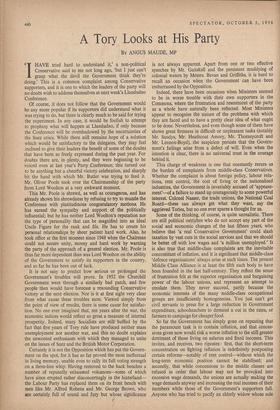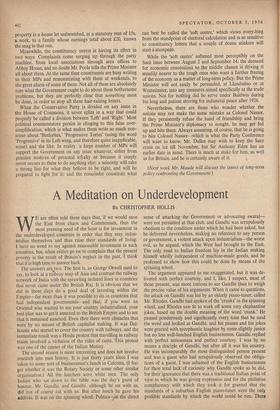A Tory Looks at His Party
BY ANGUS MAUDE, MP
I
4 HAVE tried hard to understand it,' a non-political Conservative said to me not long ago. tut I just can't grasp what the devil the Government think they're doing.' This is a common complaint among Conservative supporters, and it is one to which the leaders of the party will no doubt wish to address themselves at next week's Llandudno Conference.
Of course, it does not follow that the Government would be any more popular if its supporters did understand what it was trying to do, but there is clearly much to be said for trying the experiment. In any case, it would be foolish to attempt to prophesy what will happen at Llandudno, if only because the Conference will be overshadowed by the uncertainties of the Suez crisis. While there still remains hope of a solution which would be satisfactory to the delegates, they may feel inclined to give their leaders the benefit of some of the doubts that have been so freely expressed during the past year. For doubts there are, in plenty, and they were beginning to be voiced even at last year's Party Conference; this turned out to be anything but a cheerful victory celebration, and sharply bit the hand with which Mr. Butler was trying to feed it. Mr. Oliver Poole took over the Chairmanship of the party from Lord Woolton at a very awkward moment.
This Mr. Poole is shrewd, as well as courageous, and has already shown his shrewdness by refusing to try to muzzle the Conference with platitudinous congratulatory motions. He has earned the sympathy and support of the politically influential; but he has neither Lord Woolton's reputation nor the type of personality that can be magnified into an ideal Uncle Figure for the rank and file. He has to create his personal relationships by sheer patient hard work. Also, he took office at the first moment since 1948 when the Chairman could not secure unity, money and hard work by warning the party of the approach of a general election. Mr. Poole is thus far more dependent than was Lord Woolton on the ability of the Government to satisfy its supporters in the country. and so far he has been out of luck.
It is not easy to predict how serious or prolonged the Government's troubles will prove. In 1952 the Churchill Government went through a similarly bad patch, and few people then would have forecast a resounding Conservative victory at the next election. Nor is it at first sight very clear from what cause these troubles stem. Viewed simply from the point of view of results, there is some cause for satisfac- tion. No one ever imagined that, ten years after the war, the economic indices would reflect so great a measure of internal prosperity. Indeed, many Socialists are still baffled by the fact that five years of Tory rule have produced neither mass unemployment nor another war, and this no doubt explains the unwonted enthusiasm with which they managed to unite on the issues of Suez and the British Motor Corporation.
Certainly it is not the Opposition which has put the Govern- ment on the spot, for it has so far proved the most ineffectual in living memory, unable even to rally its full voting strength on a three-line whip. Having removed to the back benches a number of reputedly exhausted volcanoes—some of which have since erupted rather disconcertingly in the hinterland— the Labour Party has replaced them on its front bench with men like Mr. Alfred Robens and Mr. George Brown, who are certainly full of sound and fury but whose significance is not always apparent. Apart from one or two effective speeches by Mr. Gaitskell and the persistent muddying of colonial waters by Messrs. Bevan and Griffiths, it is hard to recall an occasion when the Government can have been embarrassed by the Opposition.
Indeed, there have been occasions when Ministers seemed to be in worse trouble with their own supporters in the Commons, where the frustration and resentment of the party as a whole have naturally been reflected. Most Ministers appear to recognise the nature of the problems with which they are faced and to have a pretty clear idea of what ought to be done. Nevertheless, and even though some of them have shown great firmness in difficult or unpleasant tasks (notably Mr. Sandys, Mr. Heathcoat Amory, Mr. Thorneycroft and Mr. Lennox-Boyd), the suspicion persists that the Govern- ment's failings arise from a defect of will. Even when the intention is clear, there is no universal trust in the courage behind it.
This charge of weakness is one that constantly recurs as the burden of complaints from middle-class Conservatives.
Whether the complaint is about foreign policy, labour rela- tions, rent control, the cost of living or the nationalised industries, the Government is invariably accused of 'appease- menr—of a failure to stand up courageously to some powerful interest. Colonel Nasser, the trade unions, the National Coal Board—these can always get what they want, say the aggrieved Tories, but no one ever spares a thought for us.
Some of the thinking, of course, is quite unrealistic. There are still political ostriches who do not accept any part of the social and economic changes of the last fifteen years, who believe that 'a real Conservative Government' could slash taxation by vast cuts in the social services and that we should be better off with low wages and 'a million unemployed.' It is also true that middle-class complaints are the inevitable concomitant of inflation, and it is significant that middle-class `defence organisations' always arise at such times. The present Middle Class Alliance is at least the fifth such body to have been founded in the last half-century. They reflect the sense of frustration felt at the superior organisation and bargaining power of the labour unions, and represent an attempt to emulate them. They never succeed, partly because the economic interests of the many middle-class occupational groups are insufficiently homogeneous. You just can't get civil servants to press for a large reduction in Government expenditure, schoolteachers to demand a cut in the rates, or farmers to campaign for cheaper food.
So far the Government has simply gone on repeating that the paramount task is to contain inflation, and that conces- sions given now would risk a worse inflation to the still greater detriment of those living on salaries and fixed incomes. This invites, and receives, two ripostes : first, that the short-term concentration on fighting inflation is indefinitely postponing certain reforms—notably of rent control—without which the long-term economic position cannot be stabilised; and secondly, that while concessions to the middle classes are refused in order that labour may not be provoked into excessive wage demands, the unions are actually making the wage demands anyway and increasing the real incomes of their members while those of the Government's supporters fall. Anyone who has tried to pacify an elderly widow whose sole property is a house let unfurnished, at a statutory rent of 15s. a week, to a family whose earnings total about £20, knows the snag in that one.
Meanwhile, the constituency unrest is having its effect in two ways Complaints come surging up through the party machine, from local associations through area offices to Abbey House, and no doubt Mr. Poole tells the Prime Minister all about them. At the same time constituents are busy writing to their MPs and remonstrating with them at weekends, to the great alarm of some of them. Not all of these are absolutely sure what the Government ought to do about these bothersome problems, but they are perfectly clear that something must be done, in order to stop all these hair-raising letters.
When the Conservative Party is divided on any issue in the House of Commons, it never splits in a way that could properly be called a division between 'Left' and 'Right.' Most political commentators persist in clinging to this false over- simplification, which is what makes them write so much non- sense about 'Butlerites,"Progressive Tories' (using the word 'Progressive' in its Left-wing, and therefore quite inapplicable, sense) and the like. In reality. a large number of MPs will support the Government on any issue whatever, either from genuine motives of personal loyalty or because it simply never occurs to them to do anything else; a minority will take a strong line for what they believe to be right, and will be prepared to fight for it; and the remainder constitute what can best be called the 'soft centre,' which views every; hing from the standpoint of electoral calculation and is so sensitive to constituency letters that a couple of dozen stinkers will start a stampede.
While the 'soft centre' softened most perceptibly on the Suez issue between August 2 and September 14, the demand for economic concessions to the middle classes is driving it steadily nearer to the tough ones who want a further freeing of the economy as a matter of long-term policy. But the Prime Minister will not easily be persuaded, at Llandudno or at Westminster, into any measures aimed specifically at the trade unions. Not for nothing did he serve under Baldwin during his long and patient striving for industrial peace after 1926.
Nevertheless, there are those who wonder whether the unions may not make the same mistake as Colonel Nasser. If they persistently refuse the hand of friendship and bring the Prime Minister's diplomacy to nought, he may get fed up and bite them. Always assuming, of course, that he is going to bite Colonel Nasser—which is what the Party Conference will want to know. Mr. Dulles may wish to keep the Suez crisis on ice till November, but Sir Anthony Eden has an earlier date in mind. There is much at stake for him, as well as for Britain, and he is certainly aware of it.
(Next week Mr. Maude will discuss the issues of long-term policy confronting the Governnzent.)



















































 Previous page
Previous page